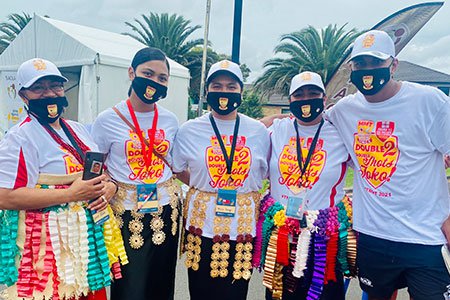My story starts as being born to Te Whakatōhea Iwi in Ōpōtiki in the Eastern Bay of Plenty. I come from a small rural town, with a large Māori population. My home town sadly is known as 'the homicide capital of New Zealand'. An area that is remote with high deprivation, unemployment and crime rates. My family left when I was young to give us better opportunities.
Beginning in the ambulance service
When I joined the ambulance service I worked initially in South Auckland, where I was confronted by the fact there was no cultural competency training for any of our ambulance staff. I was deeply affected by the state of health of our Māori and Pasifika whānau I was treating daily. It led me to want to try and champion change in this space. To improve healthcare and educational access for rangatahi, and thereby increase health literacy and knowledge within whānau.
I began volunteering for the Ministry of Health 'Kia Ora Hauora' programme to encourage Māori youth into health careers. My concern then turned to having a culturally safe workplace for these rangatahi to come to work in. So I volunteered myself to write, create and deliver cultural competency training for the ambulance service.
I then undertook developing a method to improve access to healthcare via the utilisation of paramedics to refer high need patients to in-home care to minimise unnecessary hospitalisation. It got me thinking – over 80% of the work that ambulances deal with is in fact primary care work, not acute emergency trauma/ medical emergencies. It only made sense to start looking at the utilisation of paramedics to help the ever under pressure primary care workforce in NZ. For these two projects I was recognised by the Governor General and given an award.
I trained in the Post Graduate course at AUT to be an Extended Care Paramedic. As we did not have these roles in New Zealand I went to work overseas in Australia, the Solomon Islands and Papua New Guinea to work as an ECP. This drove my desire to become a doctor, so I applied and am now in ELM2.

Pop-up clinics in response to COVID
I took HSFY off working on the project I had begun to develop. This year with COVID, lockdown and decreased access to GPs for already vulnerable communities, I had an idea. To start pop-up portable clinics, crewed by paramedics and nurses with standing orders to provide face-to-face services to these communities and COVID testing. I spent time designing these clinics and supporting their roll out – and recruiting volunteer paramedics to help us get these going.
We ran clinics in South Auckland, Northland and the East Cape through this time, all supported by my current employer Pro Med. This led to supporting permanent clinics for Māori organisations. While running these clinics we discovered multiple concerns in our communities. These clinics are free, mobile and can be available afterhours. This alleviates barriers to care such as geography, cost and availability for whānau to access healthcare.
In Ōpōtiki we learnt of the lack of emergency response care to the remote communities so have undertaken the beginning of training Iwi to manage these emergencies themselves while they await further care. We also found the lack of healthcare educational pathways for the area meant health workforce development was poor, that out of hospital cardiac arrest statistics were not poor, AED were not broadly available and nor was CPR training. There were stories of recent cardiac arrests on Maraes with lengthy ambulance responses, no AED available and a poor outcome.
To address the cardiac arrest issues, TPK have funded CPR training and AED to the Marae in the Eastern BOP, as well as a 'train the trainer' programme to have local instructors available with all the necessary training equipment to teach CPR to others to improve cardiac arrest outcomes for those in the Ōpōtiki district.
I have since taken a role with the Ministry of Health in the inaugural Paramedic Council to ensure the registration of paramedics will include and enshrine cultural competency standards for the delivery of care to whānau, as well as a commitment to diversity.
Ngā ringa ngaio whakaora
Now we are through lockdown, the charity I have started is working on the development of training opportunities for rural Māori to support them into health careers, the further and improved development of improved access to healthcare for vulnerable communities incorporating mobile clinics, teleheath and home visits. Most importantly, developing a healthcare system to recruit and train whānau, whānau, whānau are to improve whānau health. In essence, a system that is with Māori, by Māori, for Māori.
I've named the charity 'Ngā ringa ngaio whakaora' (The skilled hands of healing). While we are back in school now until October, I will largely be focused on passing my exams. But I have got an amazing group of people that have volunteered to come and help me with this challenge to change health outcomes for Māori and improve access to healthcare and education by empowering those who are most vulnerable.
Carlton Irving
Second Year – Medical Student, University of Otago

-
Share
You might also like

Community-minded veterinary students scoop scholarships
A fifth-year veterinary student making a difference for young people, and a group helping aspiring vets take care of their wellbeing, are the latest recipients of MAS Here for Good Scholarships.

MAS Foundation: Helping Pasifika families thrive with SIAOLA
In early 2020, MAS Foundation gave SIAOLA a grant to help them connect the Tongan community to health and wellbeing services during COVID-19.

MAS for Good – A day out on Matiu/Somes Island
Here at MAS, each staff member volunteers one full day per year and they pitch in for a wide variety of organisations and causes. Here is how the MAS Risk and Compliance Team spent their day doing good.